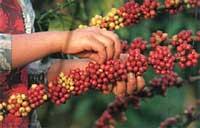Please, decaffeinated coffee and be natural

There are many people who have to drink a coffee to face the day to day: to wake up in the morning, not to sleep on the table, and in the afternoon and at dusk, what demonthree!
Coffee helps to be alert, to be more active, and to feel a sweet feeling. However, there are studies that show that coffee caffeine is addictive. If someone who is used to drinking coffee every day does not take the daily ‘dosage’, gives ‘lack’, among other things can have sleep and headache.
But if not taken with moderation it can cause a bad body: it confuses the stomach and gets a very nervous one. In addition, some people are more sensitive to caffeine, do not tolerate well, so they should avoid the consumption of caffeine drinks: coffee, tea, queues...
Decaffeining, tasting
For those who do not want to drink caffeine, or do not like it, there is also coffee without caffeine. But for the passionate coffee maker it is sin to drink decaffeinated, because it lacks the aroma of good coffee.

In fact, other compounds that influence this pleasant smell characteristic of coffee are eliminated in the coffee caffeine extraction processes. And that's why those who say that decaffeinated has little taste of coffee are right.
The extraction of caffeine is usually done with carbon dioxide or organic solvents, which in addition to reducing the taste of coffee can be harmful to health. Another option, which maintains the flavor to a large extent, is to use a carbon filter, but much more expensive than the rest of techniques, and that is why it is used less.
If we start asking for it, it would be best for the plant itself to provide coffee beans without caffeine; it would not harm health; taste and smell would remain intact and would be cheaper than any decaffeinated technique.
The truth is that for a long time, plants have been known to produce very low caffeine coffee. For example, in Madagascar it is where this type of coffee plants grow, but their quality is low, since they provide very few seeds and are not profitable for large productions.
Natural decaffeinated
In recent times, however, researchers are quite hopeful. On the one hand, Brazilian researchers have found a coffee plant without viable caffeine for production and, on the other, they have modified the caffeine gene to work with transgenic decaffeine plants.

Brazilian researchers have discovered a variety of Coffea Arabica. This species of café-plant is, precisely, the most beloved among coffee lovers for its penetrating flavor and smell. That is why they expect it to be a very good quality coffee, although with little caffeine on the traditional version.
However, it is still early to try the drink made with coffee beans from this plant, which has been moved from Ethiopia to Brazil, where they are growing. Therefore, the plant is still young and we will have to wait a few years for it to arrive and grow with seeds – coffee bean.
However, coffee producers who support the work of these researchers fear that the waiting time is too long and that others resist. Competition is hard among producers, the first one that brings cheap and sweet decaffeinated will eat the market.
And in this competition the Japanese are struggling to transform the genes of coffee plants so that they do not produce caffeine. Thus, a caffeine-free grain plant is already growing, a few years ahead of Brazilian researchers. This plant belongs to the species Coffea canephora, known as robusta. And it is not as fine and appreciated as C. arabica, so it is used to make mixtures.
However, the robust coffee is more intense against pests and is more fertile and is the second most produced coffee species in the world, C. Behind Arabica, of course. Well, the robust transgenic plant of Japanese researchers will bear fruit within about three years, and the results will be seen after tasting coffee with these specimens.

Transgenic decaffeinated is ahead of natural decaffeinated in its commercialization. But in Europe, for example, they do not expect great successes, since it is known that most Europeans are still distrustful of the issue of GMOs. However, when it reaches the market, it will be necessary to discuss which decaffeinated is better than the two: that which has been removed from caffeine by conventional techniques or that which has grown through the transformation of genes.
Although researchers are hopeful, they also have another concern. In fact, coffee companies have spent a lot of money on the research of caffeine elimination techniques and the development of technology, and it is possible that they intend to delay the planting of plants that produce grains without caffeine by themselves, until they get more of the investments made to date.
Published in 7K.
Buletina
Bidali zure helbide elektronikoa eta jaso asteroko buletina zure sarrera-ontzian











